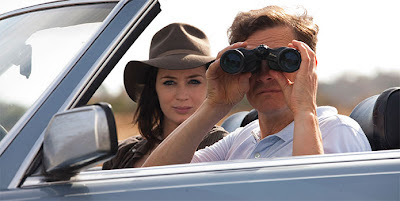Matthew Bourne’s Swan Lake: Five Things to Know
By Mireille Guy, BMFI Intern
There is something about Swan Lake that makes artists come back to it, reinterpreting the tale in some new and contemporary way. (Black Swan anyone?) Matthew Bourne’s version of the ballet might be one of the most unique of these interpretations, and his modern twist is as refreshing as it is bold.
This ballet will be a pleasure to see on Bryn Mawr Film Institute’s silver screen, and here are five reasons why:
- What most obviously makes Matthew Bourne’s Swan Lake unique is its almost all-male cast. Both the prince and Odette/Odile are played by men, as is two-thirds of the corps. Here the traditional femininity of the swan is challenged by Bourne, who has stated:
“The idea of a male swan makes complete sense to me. The strength, the beauty, the enormous wingspan of these creatures suggests to me the musculature of a male dance more readily than a ballerina in her white tutu.”
This casting decision changes the dynamic of the whole piece, creating an exciting ballet. So for those of you who have seen the traditional version of Swan Lake, don’t expect Bourne’s reinterpretation to be the same. - Bryn Mawr Film Institute is thrilled to have the renowned conductor Maurice Kaplow introduce the screening. A Lower Merion local, Kaplow has conducted for both the New York City Ballet and the Pennsylvania Ballet. He has also composed pieces for the Pennsylvania Ballet as well for Penn State University.
- First premiering in 1995, Matthew Bourne’s Swan Lake has dazzled audiences for almost two decades, and it has the Tonys to back it up—three Tonys to be exact. Matthew Bourne won Tonys in 1999 for Best Director of a Musical and Best Choreography; the show also won Best Costume Design. So add those three to the list of over 30 international awards that the show has received!
- It has royal connections. Partly due to the fact that Bourne’s Swan Lake was produced in England, there is speculation that the show can be seen as an underlying commentary on the British monarchy. More specifically, a comparison has been made between the unsatisfied and deprived prince in the ballet and Prince Charles. And on a more obvious level, the queen and the monarchy in the ballet have been compared to the British monarchy. In any case, there is definitely a regal air to the ballet.
- Remember that part at the end of the film adaption from Billy Elliot, where his father comes to see him perform as an adult? Well the film ends with Elliot magnificently leaping onto the stage in front of full crowd. In that scene, Elliot is performing Matthew Bourne’s Swan Lake—he is playing the lead swan.
Mireille Guy is a sophomore at Swarthmore College currently interning at Bryn Mawr Film Institute.


%2520BillCooper.jpg)

































